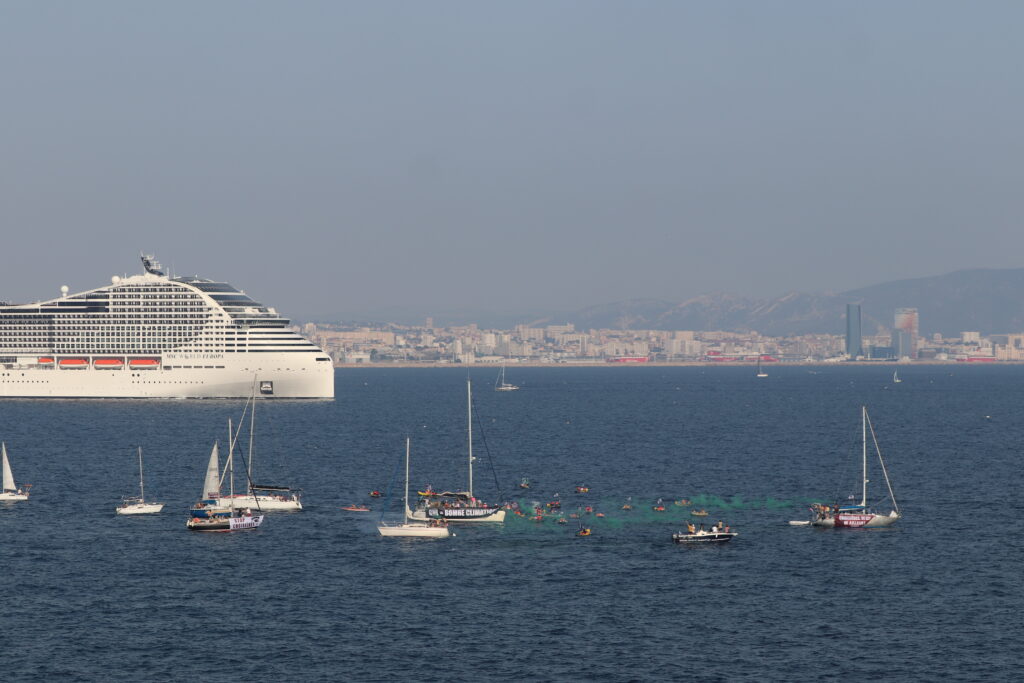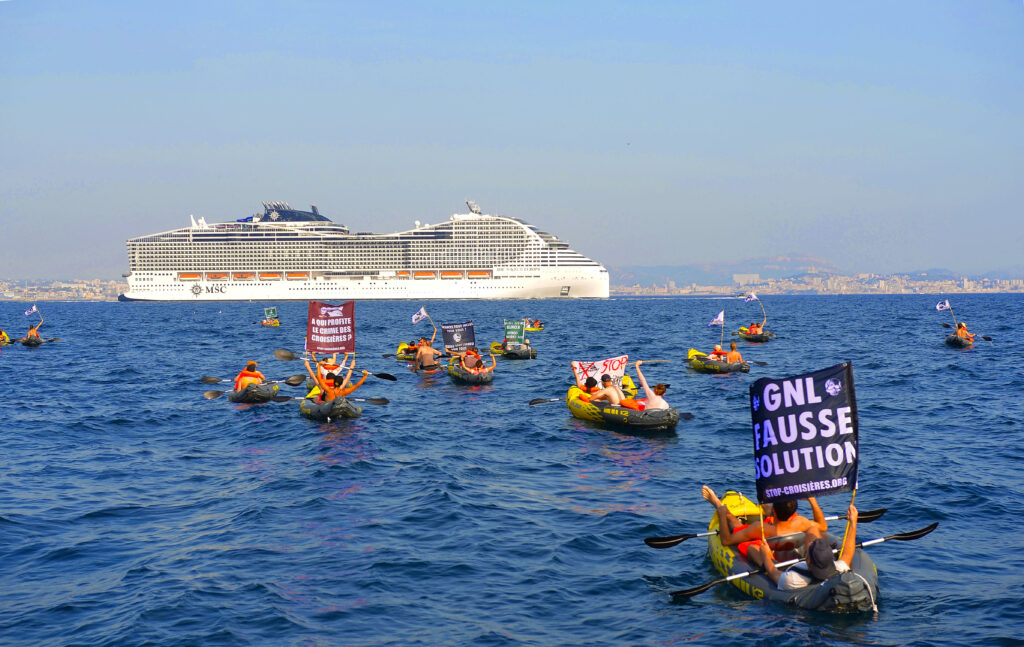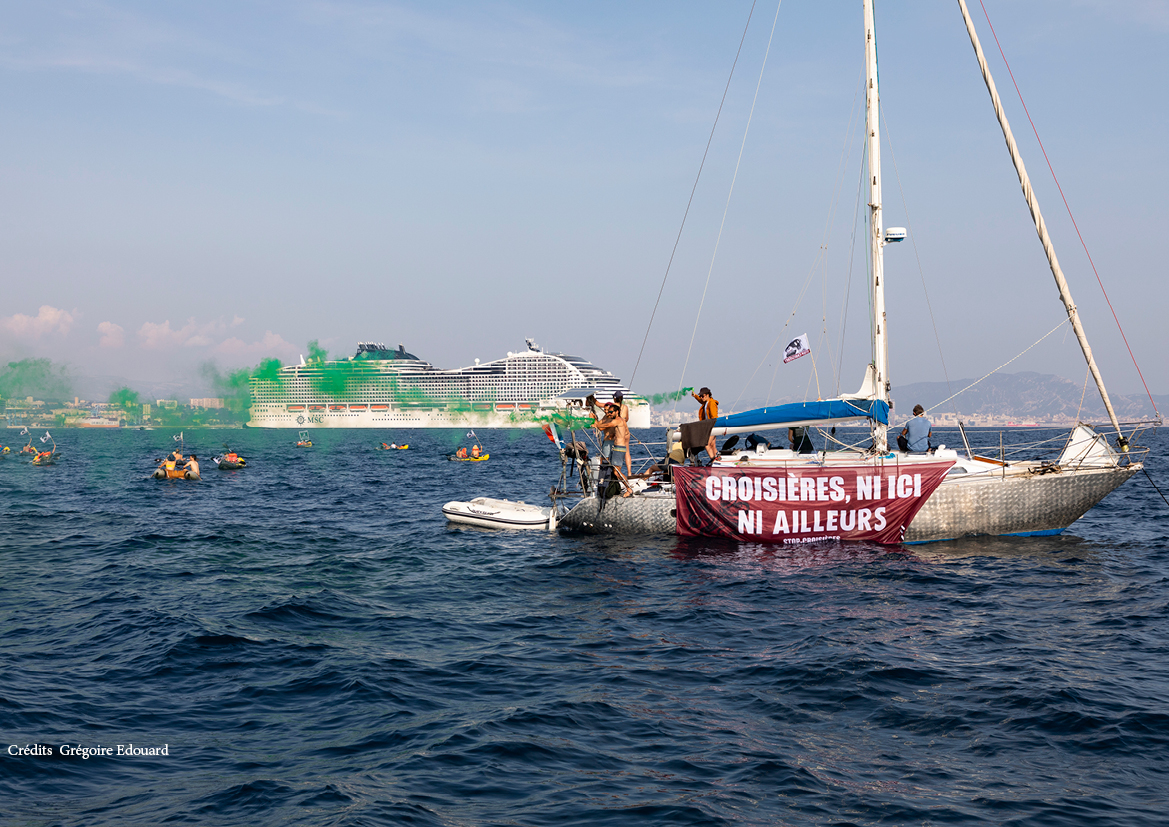LNG = New Greenwashing Avatar from cruise
Stop Cruises organized on June 17, 2023 afternoon a nautical rally to alert on the use of liquefied natural gas (LNG) by cruise ships, fuel representing a real climate -delay bomb. While the high season of cruises begins, we are determined to make the critical voice of the Marseillaise and Marseille heard on this industry adept from Greenwashing. More than 100 people were present on the water, in canoes kayaks or on sailboats.
Presented as a “new” miracle fuel (it has been there since 2003), liquefied natural gas is one of the false solutions that are most often highlighted by the cruise industry.
We target the “MSC World Europa”, the first new ship powered by the MSC shipowner, in weekly stopover in Marseille. Largest cruise liner in Europe, it checks all the huts of the sadly usual excess of the cruise: 333 meters long, which can accommodate up to 6,762 passengers, amusement parks, swimming pools, bars and restaurants in abundance … One more aberration on our seas, at the time of the call of IPCC scientists to a vital sobriety for our planet. The icing on the cake illustrating MSC’s boundless cynicism: the ship was inaugurated during the Football World Cup in Qatar, marked by ecological and social scandals. However, the amateur particularly highlights the “more sustainable” nature of this boat thanks to the use of “new generation energy”: LNG [1].

Why target LNG?
This event echoes a report by the Belgian NGO Transport & Environment [2] on the subject. Let’s be clear: the use of liquefied natural gas (LNG) is beneficial from the strict point of view of air pollution compared to heavy fuel oil, generally used by the maritime sector. It almost fully removes the rejection of sulfur oxides (SOX), and decreases emissions of nitrogen oxides (NOX) and fine particles [3].
However, LNG is in no way a “sustainable” solution. On the contrary, it constitutes a real climatic bomb and the conditions of its extraction generate considerable impact on the environment.
LNG does not in any way decrease the climate impact of maritime transport
With LNG, carbon dioxide emissions (CO2) are reduced by 20 % compared to heavy fuel oil [4] [5]; But as the NGO Transport & Environment demonstrates in its very recent ratio, the decrease in CO2 is more than offset by methane leaks [6]. And as the NGO notes, “when methane (CH4) is released in the air – even in very small quantities – its impact on the climate is disastrous”. Indeed, the extraction of natural gas, the liquefaction process, its transport and its combustion as a sea fuel inevitably produce methane leaks [7], whose greenhouse effect is much higher than that of CO2 [8] . Overall, the climatic assessment is thus negative compared to the fuel currently used!
The extraction of natural gas causes serious impacts on the environment
As indicated in the transport & environmental ratio, “it is likely that a substantial part of the LNG used by ships that get their supplies in Europe is the result of hydraulic fracturing” [9].
A substantial part of LNG used in Europe is therefore most likely shale gas. The United States, which is currently developing its LNG exports, produce it from this hydraulic fracturing method, the environmental impacts of which are devastating. The European imperative to get out of the dependence on Russian gas thanks to the war in Ukraine led the United States to become a strategic LNG supplier for Europe (up to 44% of European imports in 2022).
In addition, gas extraction projects worldwide define the chronicle by their major environmental impacts. To cite only the French company Total Energies, which hopes to become the world leader in LNG, the following examples are edifying:
- The exploitation of gas deposits in the Arctic is catastrophic for natural environments, like the development of a gas extraction program in the Yamal Peninsula [10].
- The offshore project carried off from South Africa, within an area housing a particularly rich marine life, has been the subject of a mobilization of NGOs Bloom and The Green Connection [11].

Despite these elements, the cruise lobby continues to pass its new ships supplied with LNG, fossil fuel, such as an ecological transition from the sector, voluntarily fueling the confusion between air pollution and climate impact. Once again, the cruise industry is diversioning and denies the evidence: the lasting cruise is and will remain powder in the eyes.
The dead end of LNG from a climate and environmental point of view reinforces the substantive position of our collective: “Stop Cruises!”. The right cruise is like good waste: the one you don’t produce.
[1] https://www.msccroisieres.fr/nos-croisieres/navires/msc-world-europa
[2] “Fossil gas: the poisoned maritime transport pill” – May 2023 – Transport and Environment; link
[3] “National orientation scheme for the deployment of liquefied natural gas as a sea fuel” – 2016. General Directorate of Infrastructure, Transport and the Sea; link
[4] “LNG and maritime fuel: inventory and perspectives” -Gaz mobite.fr; link
[5] “Methodological information for the carbon database> Scope 1> Combustible> Liquids” -? ; Bilan-ges.ademe.fr; link
[6] “Fossil gas – The poisoned maritime transport pill” – May 2023 – Transport and Environment. Link
[7] “Exploitation of hydrocarbons: researchers identify more than a thousand major methane leaks in the world” – 2022. France Info; link
[8] “Methane and climate change: a neglected danger that increases” – 2017. Action Action Action Climate France; link
[9] “The exploitation of shale gas devastates the United States” – 2019 – Reporterre; link
[10] “Yamal LNG: How the interests of the petroleum industry continue to take precedence over the safeguarding of the climate … and even on commercial sanctions” – 2018. Observatory of multinationals; link
[11] “The ocean: total destruction” – October 2022 – Bloom and The Green Connection; link
One photo credits: Grégoire Edouard.

